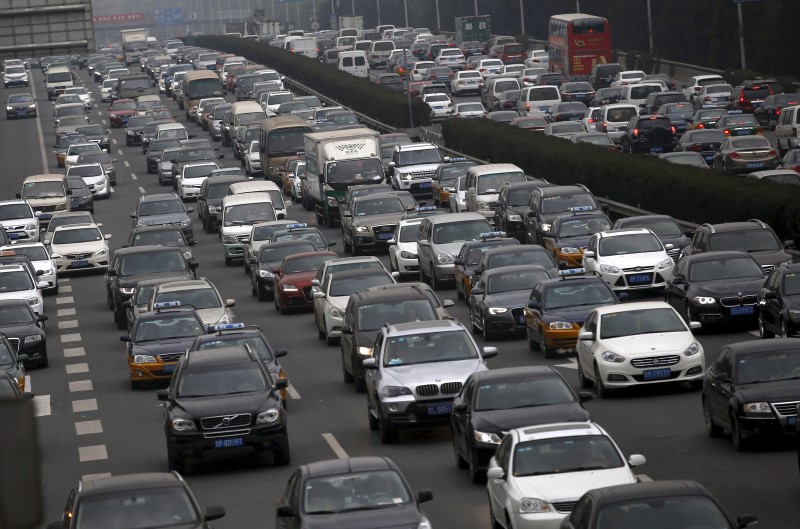By Norihiko Shirouzu
BEIJING (Reuters) - Some global automakers are worried that China is pushing its weight around as the world's biggest car market - by enforcing its own, often outdated, vehicle certification standards on foreign cars.
China previously allowed global brands to sell cars without local certification in many cases, as long they were approved under international standards. Chinese rules essentially apply older standards to features such as bumper strength, brake performance and the size and positioning of lamps and mirrors.
Global car makers say the move to enforce local standards more rigorously highlights the unpredictability of doing business in China, is a step back in technology and could mean costly re-designs and delayed new car launches.
In one instance, Chinese regulators made an issue of the position of a Nissan Motor (T:7201) car's fog lamps - something that has since impacted other automakers, people with knowledge of the matter said.
Shifting a lamp by a few centimeters can mean re-designing exterior body panels, investing in stamping dies and lighting assemblies, and delaying planned launches by more than a year, said people close to the Japanese Automotive Manufacturers Association (JAMA).
"It's an inconvenient and sudden departure from the status quo," said an executive at a leading international automaker. "We're essentially being asked to redo some aspects of new vehicles in China using outdated standards. This may cost us critical time and money."
To be sure, compliance won't break the bank, but car makers are concerned they may be sacrificing technical advances as China's standards can lag global norms by as much as a decade.
"They can enforce whatever standards they want. The question is: are those standards high enough to protect consumers," said Yale Zhang, head of Shanghai-based consultancy Automotive Foresight. "People think China does not have proper standards and that's why the car quality here is lower."
STANDARDS LAG
As European certification standards - the de facto global norm - have evolved in line with advances in technology, China's have lagged behind. Foreign car makers say this is in part because China wanted to help protect its domestic automakers from competition.
Feng Yi, director of the China Automotive Technology and Research Center (CATARC), which oversees the National Technical Committee of Auto Standardization, said there was no aim to protect local producers or hinder foreign automakers. In emailed comments to Reuters, he said local standards had lagged those from Europe, though China was now speeding up setting its own standards, based on European rules.
"However, because it takes quite a long time to set up or update standards and prepare new auto products, new standards will still be one step behind compared with (Europe)," he said.
After a decade of double-digit growth, helped by subsidies and other policy measures, China's light vehicle sales slowed to single-digit growth last year, and research firm JD Power predicts that will likely be the norm for the next few years.
"We'll see more of this as the market slows ... to make sure state-owned and domestic automakers will be solvent," said John Humphrey, a JD Power consultant. "Without that, a lot of those companies won't be able to withstand the raw market forces."
A spokesman for Chinese automaker Zhejiang Geely [GEELY.UL] said he did not know if the shift was benefiting local car makers. "Geely Auto's design, R&D and production facilities fully comply with standards and certification in China and in overseas markets where our vehicles are sold," he said.
INNOVATION HURDLE
In another case, Honda Motor (T:7267) was told by Chinese regulators that sensor frequencies in one of the on-board diagnostic systems monitoring engine and transmission performance and tire pressure on one of its new models did not meet their certification standards.
Spokespersons for Nissan and Honda declined direct comment, but said they support the JAMA playing a lead role on this issue. A Toyota spokesman declined to comment.
The JAMA sent a delegation to Beijing in November to voice its concern to the CNCA department that deals with automotive certification, three people close to the JAMA said. Feng at the CATARC said he was not aware of any such meeting.
The European Automobile Manufacturers Association (ACEA), which represents firms including Volkswagen (DE:VOWG_p), Daimler (DE:DAIGn) and BMW (DE:BMWG) as well as top U.S. manufacturers, says it prefers its car makers to try to resolve issues themselves case-by-case.
China representative Dominik Declercq said the ACEA welcomed signs of China embracing the rule of law, and "less arbitrarily" than before, but has concerns about the impact on future sales.
"It's not hard to see how (this) might be harmful to the introduction of innovative products to China," he said. "We do sense (global automakers) collectively may face new hurdles."
